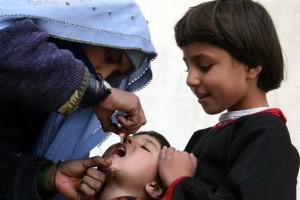 Just as India celebrated a full year without a single new case of polio this month, Afghanistan and Pakistan officials released data that showed nearly a threefold increase in polio cases in 2011. Although the total numbers were rather small — 76 (up from 25 in 2010) in Afghanistan and 192 (up from 80 in 2010) in Pakistan — the dramatic increase was particularly disheartening because both countries were so close to eradication. Indeed, polio is considered endemic in only three countries in the world, with Nigeria the other still reporting new cases each year.
Just as India celebrated a full year without a single new case of polio this month, Afghanistan and Pakistan officials released data that showed nearly a threefold increase in polio cases in 2011. Although the total numbers were rather small — 76 (up from 25 in 2010) in Afghanistan and 192 (up from 80 in 2010) in Pakistan — the dramatic increase was particularly disheartening because both countries were so close to eradication. Indeed, polio is considered endemic in only three countries in the world, with Nigeria the other still reporting new cases each year.
Politicians were quick to place the blame. President Hamid Karzai of Afghanistan blamed the Taliban. “Those who stand in the way of vaccination are the true enemies of our children’s future,” he said, calling on “the armed opposition to allow the vaccination teams to help save children against the lifetime paralysis.” Taliban leaders fought back, citing no change in their policy of allowing immunization teams to freely travel through territories they occupy. “It is not for Karzai to ask us to attack or not to attack someone,” said the Taliban’s southern Afghanistan spokesman, Qari Yousaf Ahmadi.
Health officials appear to have their own view, citing many new cases in parts of Afghanistan where polio was seldom seen in the past. Historically, polio cases have been prevalent in the Pashtun belt of the southern region. In 2011, cases were spread by refugees fleeing the war torn South for other parts of Afghanistan. Muhammed Taufiq Mashal, the director of preventive medicine in the Afghan Ministry of Public Health, blames much of the polio increase on infiltration from neighboring Pakistan. This allegation has been confirmed by World Health Organization scientists who showed that the genetic sequence of many viruses isolated in Afghanistan match those from Pakistan.
Naqibullah Faieq, a member of the Afghan Parliament, said, “This health issue is nonpolitical, nonmilitary. We want both the government and the Taliban to not use the issue of vaccination in their speeches.” Members of the World Health Organization responsible for tracking the incidence of polio agree. Dr. Bruce Aylward, the polio coordinator for the World Health Organization, believes that the efforts to eliminate polio from Afghanistan and Pakistan will only be successful if vaccination efforts remain unimpeded by opposing political groups.
Smallpox was eliminated in 1977. Will polio be next?
Photo from The Global Polio Eradication Initiative.

